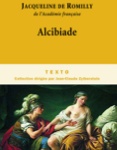He had all the gifts: coming from a very noble and very wealthy family, with a beauty that naturally inclined him towards seduction and its excesses, an ambition fueled by rare intellectual faculties; such was the “beautiful Alcibiades” whose story the academician Jacqueline de Romilly deftly tells us in a reissue of one of her famous works devoted to the century of Pericles. A character that this “rigorous Hellenist,” by frequenting the Athens of the 5th century BCE, admits to “having known forever.” Ward of the founder of Athenian democracy, friend of Socrates, and at the “center of all political life” during this crucial period for ancient Greece, young Alcibiades, after the indiscretions of a golden youth marked by a “luxuriosus, dissolutus, libidinosus…” demeanor, decides in 420 to enter the political arena. He can only aim for the highest magistrature, “elective and renewable” due to the military responsibilities it entails: he will become a strategist.
At war against Sparta and the Peloponnesian League since 431, the Athenian city, whose military activities had “occupied the youthful years” of Alcibiades, was to kindle in the young man an insatiable ambition to lead the affairs of this vast maritime empire. As much by strategic vision as by personal tactic against a competitor vying for the same position he coveted, he adopts a committed course of action and decides in favor of conflict with Sparta, concerning the question of an alliance with the Argive people.
With her particular style of the scholar who knows, in a single sentence, how to resituate a context, announce an action, or illuminate a decision, Jacqueline de Romilly takes us into the intricacies of the complex Athenian diplomacy by describing an “audacious” Alcibiades gifted with “finesse.” To the point that, as Talleyrand would seriously explain centuries later, he would “pretend to be the instigator of events beyond him.” Even though she is benevolent towards a hero with whom she often seems complicit, making the reading surprisingly enjoyable without ever falling into the trap of a romanticized biography, the writer bases her work on solid historical references and sources clearly listed from the introduction. Contemporary to Alcibiades, Thucydides forms the undeniable pillar. Between the war driven, the author tells us, by the “Athenian imperialism’s inherent need for continuous growth” and “affairs” where boudoir gossip mingles with vast political designs—offering the academician the opportunity for a pertinent reflection on modern inadequacies capable of endangering our democracy—Alcibiades is forced into exile. Never resolving to inactivity or collapse, unthinkable due to his nature and upbringing, unjustly condemned, he skillfully engages the enemy, Sparta, before being chased away and taking refuge with the Persian satrap Tissaphernes. Necessity becomes virtue, as each one surpasses themselves, the author ironically recounts, “in the exchange of flattery.” But the first is already preparing his grand return to Athens! The account of his death, oscillating between the hypothesis of a conspiracy schemed by irreducible opponents and that of an honor crime committed over a mundane love affair, provides a final opportunity for the first woman professor at the Collège de France to evoke with “emotion” him who inspired Plato’s most political pages. And those of psychoanalysis, which continues to draw from this complex personality numerous free associations.
Jacqueline de Romilly, “Alcibiades,” Coll. “Texto,” Editions Tallandier, 2008. (All of Jacqueline de Romilly’s books on Fnac.com)


